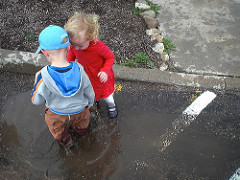
CC Photo – by Timlewisnm
This week in the digital literacy course I’m taking we watched Logan LePlante’s TEDx talk Hackschool Makes Me Happy (you can watch it here). The general theme of the talk is about how educating children in more creative ways can open them up to greater potential happiness and better overall learning experiences.
One of the best things about this talk is that it is being given by a teenager. Often, when an adult is the spokesperson for education we forget that the student has a voice as well.
As I’ve mentioned in previous posts, I was raised in a homeschool environment. While my own education was not necessarily as well executed as it could have been, I still found the benefits in a non-traditional education. For the most part I was left on my own. If I wanted to know something, I had to want it badly enough to put in the time to learn about it. No one stood over my shoulder, no one checked on me to make sure I was learning. A homeschooling environment led me to start my own business at the age of eight. I learned how to twist balloon animals, I purchased the product necessary, and then I called different restaurants in town to find someone who would hire me. I even had business cards. I felt pretty cool!
If I had been constrained by traditional school hours and a stereotypical learning environment I might never have had the chance to allow my interests to branch out into the realm of balloon twisting.
I’m pretty hard on the school system. But I think we have to be hard on it, because it isn’t measuring up. Which means we need to create a change. We can’t sit around waiting for schools to become more creative if we aren’t doing anything to change them. We can’t expect them to foster the arts if we don’t speak up when the common core is touted ever more frequently as the priority.
LePlante talks at length about the opportunities his nontraditional education offers him. But how many students actually have the chance to learn the way he does? Realistically, what are the costs related to all of his travel and education compared to the more affordable public school? As a parent who is considering a nontraditional education for her own child I know that I can’t afford to educate my child at home the way I would want to. I have to work. What options are there for people in small towns?
Either we make a change in the public school system or the majority of parents won’t be able to afford to take alternative routes towards educating their children.
After reading Bud Hunt’s blog post, “Centering on Essential Lenses: Make/Hack/Play” (you can read it here) I can’t help but agree that we have lost sight of how important figuring something out independently can be to the student. Hacking, as he puts it, is essentially just fiddling with something to make it better.
When I was a kid I was left alone to repair computers, to cook my own meals (just so you know: cinnamon in your scrambled eggs is pretty gross. I found that out the hard way.), to dance, to play, to learn independently. I was allowed to create and fiddle at will. I gained a lot of confidence from that. Today’s educational system often leaves the parents making their child’s school projects for them. Kids have lost the ability to fiddle in the quest for a good grade. Instead of praising the quality of the project produced, the child should be praised for the hard work they put into the project.
Hunt talks about the impact of agency on the learning process. While I never had to get up a certain time to go to school, I definitely gained a full awareness of my agency. My education pretty much goes in the face of all the traditional standards. So here’s what I learned from my own Hackschooling experience. If I put in the work I can do almost anything. No one can stop me from learning, and if I can learn how to do it, I can make it happen.

I really loved reading this post! It is so awesome that you were able to start a business at such a young age! I totally agree that you probably would not have had such a great experience if you were enrolled in the traditional education. I also think that we need to be hard on the school systems. They are not doing their best and are constantly leaving children, such as yourself who do not fit the “traditional” mold, in the dust. I am a firm believer of process not product and that is something that is hard to find in the school districts.
LikeLike
Thank you! I’m glad you liked my post. It really frustrates me that there is so much conversation about the potential benefits of a more creative form of education in the public school system and so little action. Honestly, I think the number of students who actually fit the “traditional” mold are few and far between. One of the benefits of a more creative educational system would be that perhaps we could leave the idea of a one size fits all education behind.
LikeLike
Stephanie,
I really enjoyed reading your post! It was interesting to read all of the experiences you went through as a homeschooled child. It was a dream of mine to do be homeschooled, but alas, it did not happen. It’s interesting that you learned so much and by yourself. I agree that if children were given the opportunity to learn by themselves, they would and they could. They are naturally curious and want to learn how things work, just as you did with the computer. Everyone isn’t programmed to hate learning, but they begin to when they get shut down by adults and teachers if they have an idea or a “weird” question to ask and they get discouraged to like school. I agree; when I was teaching at daycare, I would the after school program we had and I would talk to the school agers about what projects they have or what they would bring back from school. Often times, when I would ask them if it was hard, they would say “I don’t know my mom/dad did it for me” because the parent didn’t like the way the child was doing it or because the child didn’t “know” how. But they learn that way, from making mistakes and by practicing.
Nancy
LikeLike
I think that, sometimes, we get so caught up in the idea that there is a “right way” to learn that we forget that there more than one “right way.” When we stomp the creativity out of kids trying to force them to conform to our idea of how you’re supposed to learn it’s a tragedy. There are as many ways to learn as there are people, because each person learns differently from the last.
LikeLiked by 1 person
Stephanie, I really enjoyed hearing about your thoughts on this TED talk considering that you were also homeschooled. I have an aunt who homeschooled all of her children and I find it very interesting how diverse the system is compared to public school. I like how you talked about how if you wanted to learn something, you had to work for it. It sounds to me like you have a drive and passion for learning which is something we all need! Like you said, we should be hard on schools because if we aren’t critical, how can we improve upon what is wrong! Great post!
LikeLike
I’m worried that that drive to learn gets stomped out in a cookie cutter styled educational system. Thanks for your comment!
LikeLiked by 1 person
Hear hear! I agree with you: the way school is currently done benefits almost nobody. Even students who thrive in that environment are often thriving at significant cost to their well-being. A complete overhaul of the system is unrealistic, so my question is always, how can we hack what we’ve got to make it more functional for more people? That often means looking for solutions and hacks from other fields and experiences. I think there is a lot we can learn from homeschooling to apply in the classroom.
LikeLike